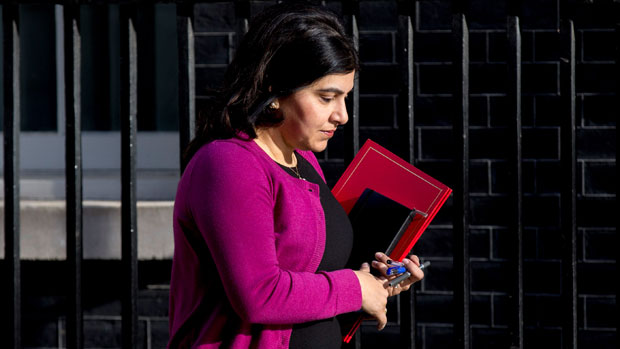Baroness Warsi: was Gaza the only motive for resignation?
Warsi steps down in protest at the government's 'morally indefensible' policy in the Middle East

A free daily email with the biggest news stories of the day – and the best features from TheWeek.com
You are now subscribed
Your newsletter sign-up was successful
Baroness Warsi, a senior Foreign Office minister, has resigned in protest at the Government's policy on Gaza, describing it as "morally indefensible".
She announced her departure on Twitter today and posted her resignation letter to Prime Minister David Cameron in full.
With deep regret I have this morning written to the Prime Minister & tendered my resignation. I can no longer support Govt policy on #Gaza — Sayeeda Warsi (@SayeedaWarsi) August 5, 2014
Warsi, the first Muslim to sit in the Cabinet, warns that the Government's policy in relation to the Middle East peace process was not in Britain's national interest and will have a "long-term detrimental impact" on its reputation at home and abroad.
The Week
Escape your echo chamber. Get the facts behind the news, plus analysis from multiple perspectives.

Sign up for The Week's Free Newsletters
From our morning news briefing to a weekly Good News Newsletter, get the best of The Week delivered directly to your inbox.
From our morning news briefing to a weekly Good News Newsletter, get the best of The Week delivered directly to your inbox.
"I always said that long after life in politics I must be able to live with myself for the decisions I took or the decisions I supported," she writes. "By staying in government at this time I do not feel I can be sure of that."
Her resignation highlights concerns that Cameron has failed properly to condemn Israel's actions in Gaza, leaving the PM with a "political headache as he rejoins his family on holiday in Portugal", says The Times.
Today a Downing Street spokesman said Cameron was grateful for the "excellent" work Warsi had done as a minister and in opposition. "Our policy has always been consistently clear – the situation in Gaza is intolerable and we've urged both sides to agree to an immediate and unconditional ceasefire," they added.
In The Spectator, Isabel Hardman says Warsi "gives credence" to Labour leader Ed Miliband who has argued that the Prime Minister is not being sufficiently robust in his dealings with Israel. In response the Tories accused Labour of playing politics and even undermining Britain's efforts to secure peace. "It is one thing to say that of an opposition leader, but if one of your Conservative colleagues makes the same accusation... it is quite a different matter," says Hardman.
A free daily email with the biggest news stories of the day – and the best features from TheWeek.com
Aside from the Gaza debate, several commentators, such as The Guardian's Mark Tran, note that Warsi was "an uncomfortable fit with Tory ranks".
She has made forthright comments about immigration and religion. She compared banning the burka to outlawing the miniskirt and "made waves" in March when she held up a sign suggesting there needed to be an end to the "Eton mess" at the heart of Downing Street.
The Daily Telegraph's Dan Hodges thinks Warsi's resignation has more to do with a 2012 Cabinet reshuffle that it does with Gaza. Warsi was made Conservative Party co-chairman following the 2010 general election, but was subsequently moved to the post of Minister of State at the Foreign Office and Minister for Faith and Communities in 2012.
Hodges, who describes Warsi as an "ineffective" party chair, and an "unpopular" member of the Government, says: "It's been an open secret in Westminster that Warsi has been angered since her demotion from Tory party chair."
-
 What is the endgame in the DHS shutdown?
What is the endgame in the DHS shutdown?Today’s Big Question Democrats want to rein in ICE’s immigration crackdown
-
 ‘Poor time management isn’t just an inconvenience’
‘Poor time management isn’t just an inconvenience’Instant Opinion Opinion, comment and editorials of the day
-
 Bad Bunny’s Super Bowl: A win for unity
Bad Bunny’s Super Bowl: A win for unityFeature The global superstar's halftime show was a celebration for everyone to enjoy
-
 How corrupt is the UK?
How corrupt is the UK?The Explainer Decline in standards ‘risks becoming a defining feature of our political culture’ as Britain falls to lowest ever score on global index
-
 ‘Bad Bunny’s music feels inclusive and exclusive at the same time’
‘Bad Bunny’s music feels inclusive and exclusive at the same time’Instant Opinion Opinion, comment and editorials of the day
-
 How long can Keir Starmer last as Labour leader?
How long can Keir Starmer last as Labour leader?Today's Big Question Pathway to a coup ‘still unclear’ even as potential challengers begin manoeuvring into position
-
 How Iran protest death tolls have been politicised
How Iran protest death tolls have been politicisedIn the Spotlight Regime blames killing of ‘several thousand’ people on foreign actors and uses videos of bodies as ‘psychological warfare’ to scare protesters
-
 The Board of Peace: Donald Trump’s ‘alternative to the UN’
The Board of Peace: Donald Trump’s ‘alternative to the UN’The Explainer Body set up to oversee reconstruction of Gaza could have broader mandate to mediate other conflicts and create a ‘US-dominated alternative to the UN’
-
 The high street: Britain’s next political battleground?
The high street: Britain’s next political battleground?In the Spotlight Mass closure of shops and influx of organised crime are fuelling voter anger, and offer an opening for Reform UK
-
 Israel’s E1 zone in the West Bank: the death of the two-state solution?
Israel’s E1 zone in the West Bank: the death of the two-state solution?The Explainer Controversial new settlement in occupied territories makes future Palestinian state unviable, critics claim
-
 ‘The security implications are harder still to dismiss’
‘The security implications are harder still to dismiss’Instant Opinion Opinion, comment and editorials of the day